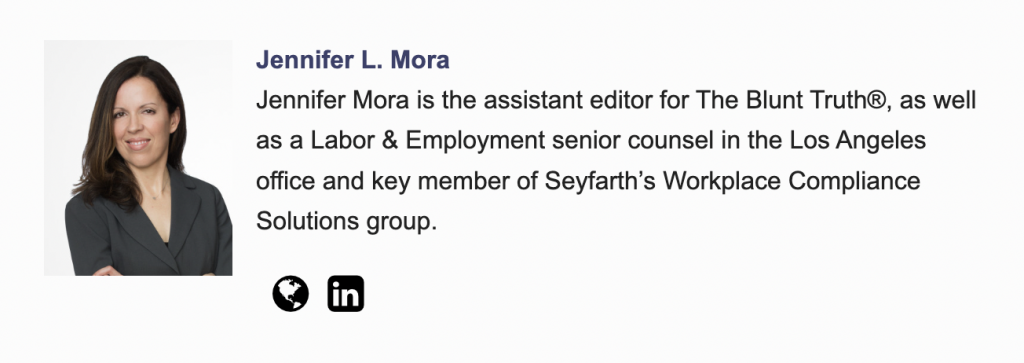On May 25, 2022, Rhode Island Governor Daniel McKee signed “The Rhode Island Cannabis Act,” which grants adults aged 21 and older the right to possess and grow certain amounts of cannabis for recreational use. Retail sales are expected to begin as early as December 1, 2022. The new law, which is effective immediately, joins the growing number of states restricting the ability of employers to conduct pre-employment cannabis testing and act based on their employees’ lawful off-duty use, most recently in District of Columbia and New York.
 The Cannabis Act allows employers to maintain and enforce a drug-free workplace policy that prohibits employees from using or possessing cannabis in the workplace and from being under the influence of cannabis while they are performing work, including remote work. The law also does not require employers to accommodate the medical use of cannabis in any workplace. Of course, employers still must be mindful of the employment protections included in the state’s separate medical marijuana law.
Employers cannot, however, terminate or take any disciplinary action against an employee based solely on the employee’s private, lawful use of cannabis outside of the workplace, unless the employer can prove the employee has worked, or is working, under the influence of cannabis. As a positive cannabis test result does not prove impairment, an employer must show other indicia of impairment if it takes action against an employee it believes to be under the influence or impaired while working.
These protections do not apply if:
The Cannabis Act allows employers to maintain and enforce a drug-free workplace policy that prohibits employees from using or possessing cannabis in the workplace and from being under the influence of cannabis while they are performing work, including remote work. The law also does not require employers to accommodate the medical use of cannabis in any workplace. Of course, employers still must be mindful of the employment protections included in the state’s separate medical marijuana law.
Employers cannot, however, terminate or take any disciplinary action against an employee based solely on the employee’s private, lawful use of cannabis outside of the workplace, unless the employer can prove the employee has worked, or is working, under the influence of cannabis. As a positive cannabis test result does not prove impairment, an employer must show other indicia of impairment if it takes action against an employee it believes to be under the influence or impaired while working.
These protections do not apply if:
 The Cannabis Act allows employers to maintain and enforce a drug-free workplace policy that prohibits employees from using or possessing cannabis in the workplace and from being under the influence of cannabis while they are performing work, including remote work. The law also does not require employers to accommodate the medical use of cannabis in any workplace. Of course, employers still must be mindful of the employment protections included in the state’s separate medical marijuana law.
Employers cannot, however, terminate or take any disciplinary action against an employee based solely on the employee’s private, lawful use of cannabis outside of the workplace, unless the employer can prove the employee has worked, or is working, under the influence of cannabis. As a positive cannabis test result does not prove impairment, an employer must show other indicia of impairment if it takes action against an employee it believes to be under the influence or impaired while working.
These protections do not apply if:
The Cannabis Act allows employers to maintain and enforce a drug-free workplace policy that prohibits employees from using or possessing cannabis in the workplace and from being under the influence of cannabis while they are performing work, including remote work. The law also does not require employers to accommodate the medical use of cannabis in any workplace. Of course, employers still must be mindful of the employment protections included in the state’s separate medical marijuana law.
Employers cannot, however, terminate or take any disciplinary action against an employee based solely on the employee’s private, lawful use of cannabis outside of the workplace, unless the employer can prove the employee has worked, or is working, under the influence of cannabis. As a positive cannabis test result does not prove impairment, an employer must show other indicia of impairment if it takes action against an employee it believes to be under the influence or impaired while working.
These protections do not apply if:
- The employer is a federal contractor or otherwise subject to federal law or regulations such that failure to take such action would cause the employer to lose a monetary or licensing-related benefit.
- The employer and any labor union representing the employees have negotiated a collective bargaining agreement that prohibits off-duty cannabis use.
- The employee works in a position that is hazardous, dangerous, or essential to public welfare and safety, which includes, but is not limited to: the operation of aircraft, watercraft, heavy equipment, heavy machinery, commercial vehicles, school vehicles, school buses, or public transportation; the use of explosives; public safety first responder jobs; and emergency and surgical medical personnel. If the employee works in such a position, the employer may adopt and implement policies which prohibit the use or consumption of cannabis within the twenty-four (24) hour period prior to a scheduled work shift or assignment. Of course, those working in Department of Transportation-regulated safety-sensitive positions, such as commercial motor vehicle drivers, pilots, and pipeline employees, are subject to mandatory alcohol and drug screening. The DOT has issued separate bulletins reminding DOT-regulated employers and their employees that it “remains unacceptable for any safety-sensitive employee subject to drug testing under the Department of Transportation’s drug testing regulations to use marijuana,” even for medicinal use.
